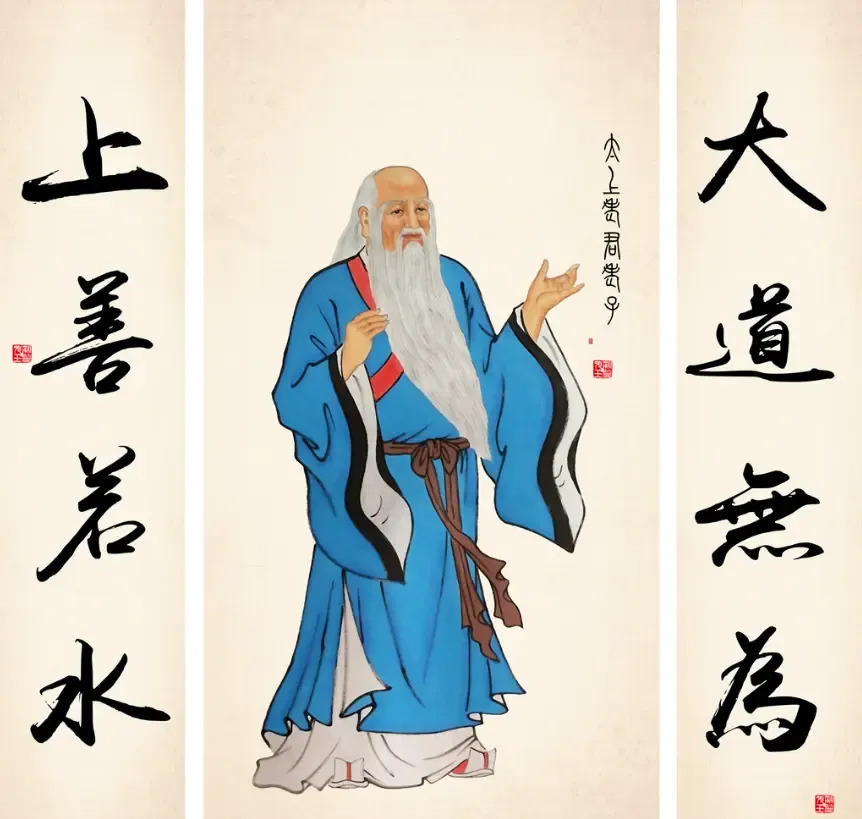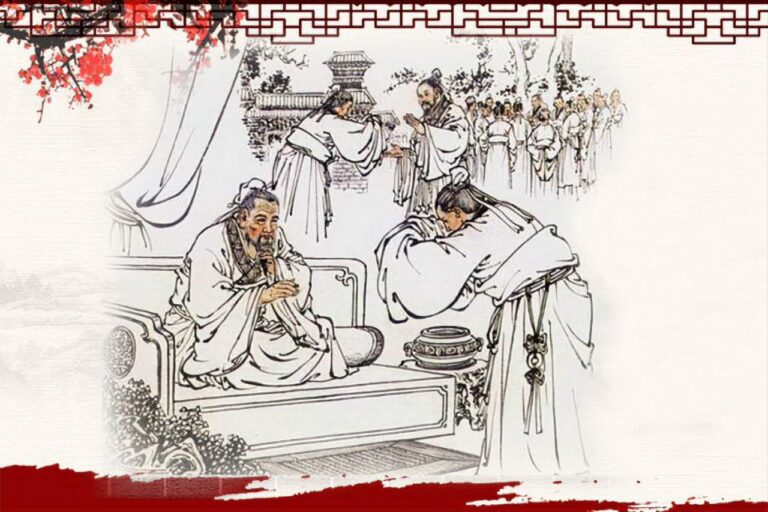
Deconstructing the Taoist Thought of Traditional Chinese Management
If we use one word to summarize management thinking, it is “doing nothing and yet doing something”, which is the most philosophical and wise thought of the Chinese nation.
Taoist Thought of Doing Nothing but Action
The wisdom of Taoist thought cannot be interpreted by people of this era. This is determined by the limitations of the times, just like when people today accuse or criticize the ignorance of their predecessors, the predecessors were also limited by the times, not that people today are more intelligent. Of course, this does not affect the criticism of them, although it is a bit unfair, but the essence of the scientific spirit lies in negation and criticism. Without negation and criticism, there will be no transcendence and innovation.
The most powerful aspect of Taoist thought is its complete subversion of management. The management thoughts of Confucianism, Mohism and Legalism all clearly explain the organizational attributes of management, which conform to the general laws. However, Taoist thought aims to completely eliminate the management of the “visible hand” and realize the management of the “invisible hand”. Taoist thought believes that human characteristics are the root of the problem. The more obvious the human characteristics are, the more complicated the organizational management is. Therefore, the goal of Taoist thought is to eliminate the organization, eliminate human nature, eliminate management , and fundamentally solve the management confusion.
Although Taoist thought is the most intelligent thought, it is also the most detached from historical reality. Therefore, it can only play a supplementary role in traditional management thought and fill the vacuum between Confucianism and thought.

Organizational Vision – A World of Supreme Virtue
The thinker Lao Tzu attributed social chaos to the complexity of human nature, and that both good and evil would cause social problems: “When the great way is abandoned, there is benevolence and righteousness; when wisdom emerges, there is great hypocrisy; when relatives are not harmonious, there is filial piety; when the country is in chaos, there are loyal ministers.” He believed that eliminating human nature would also eliminate social problems, and thus the organizational vision proposed for Taoist thought is “the world of supreme virtue.”
“In an era of great virtue, the virtuous are not valued, and the capable are not employed. The ruler is like a signpost, and the people are like wild deer. They are upright without knowing that it is righteousness, they love each other without knowing that it is benevolence, they are honest without knowing that it is loyalty, they do what is right without knowing that it is trustworthiness; they are stupid but use each other without knowing that it is a gift …” This is a vivid description of the social vision.
Taoism advocates that people give up the behavior of transforming nature and basic human characteristics such as benevolence, righteousness, propriety, and wisdom, restore the simple and true self, and maintain a primitive life without restraint, ignorance, and desire. In the “world of supreme virtue”, people and all kinds of creatures abide by the laws of nature, so that humans are completely in a natural state. There is no so-called “artificial” moral concepts such as benevolence, righteousness, propriety, and wisdom, and there is no hypocrisy, no deception, and no chaos. Human ignorance and desirelessness will have unrestrained and unfettered freedom, social morality will be in an extremely pure state, and will not destroy the living environment. The relationship between man and nature is “the heaven and the earth are born with me, and all things are one with me”, which is a state of unity between man and nature, a state of “no world”.

Management philosophy——Natural law
In an invisible organization, one can only abide by the natural laws of the environment. This natural law is the self-regulating force of the environment, an “invisible hand” that will affect anyone who is in it.
Lao Tzu, a great thinker, has long seen through the nature of human nature. Whether good or evil, it does not play a positive role in management, but is the root of the problem. As long as humans have human nature, there will be management problems. When the laws of nature are abandoned by humans, various moral dogmas and legal norms that distort human nature will be generated. Taoist management thought clearly points out that “ruling a country with wisdom is a thief to the country; not ruling a country with wisdom is a blessing to the country.” When wisdom is generated, there will be true and false, big and small, but wisdom itself has no evaluation criteria, and its results can only be verified in practice. This verification process has no practical significance for the world, because it is not necessarily a positive result.
Therefore, the Taoist method is to try every possible way to eliminate the characteristics of human nature.

Management model: small country with few people
Through our understanding of the “Age of Supreme Virtue”, we can actually imagine that this is an intangible social form. Since the intangible social (organizational) form cannot be realized, the best model is a small country with a small population.
Small country with few people is a typical small but good, small but refined model. This model is “even if there are boats and carriages, there is no place to ride them. Even if there are armor and weapons, there is no place to deploy them.” Its management cost is the lowest and the organizational efficiency is the best. In this model, “they enjoy their food, wear beautiful clothes, live in a safe house, and enjoy their customs. Neighboring countries can see each other, the sounds of chickens and dogs can be heard, but the people will not interact with each other until they die of old age.” This is a desireless and free lifestyle, which is most compatible with China’s long-term self-sufficient small peasant economic system. Therefore, Taoist thought has always been respected by the grassroots groups.
The size of the vassal states in the pre-Qin period was not large, and the “small state with few people” in Taoist thought was even smaller. However, this was completely contrary to the traditional thought of great unification, so it would not become the mainstream. Instead, Taoism was able to become the temporary mainstream, which had its roots in Taoist thought but was very different from it.

Management foundation – “Tao”
The Taoist management system is based on the “Tao”. What is the “Tao”? There are many different opinions.
Taoists believe that “Tao” is the root of all things, and all things change naturally according to their own nature, so the great “Tao” itself also changes according to the laws of nature, which comes from the Taoist understanding of the laws of development of things: “The reason why heaven and earth can last long is that they do not produce themselves, so they can live forever.” In Taoist thought, “Tao” has become the origin of all things and the omnipresent driving force. At the same time, it is subtle and difficult to recognize, so-called “Tao can be said, but it is not the real Tao.”
Taoist thought believes that management should conform to the “Tao” rather than intentional human behavior. Anything “artificial” does not conform to the requirements of the “Tao”, because things themselves have their own laws of development. At this time, “artificial” and “inaction” form a sharp contrast, and “inaction” is the hard truth.
The ultimate goal of Taoist thought is to eliminate the management rules of human society and replace them with natural laws. Therefore, in addition to Confucianism’s “ritual” and Legalism’s “law”, a third management foundation, “Tao”, is formed. Taoist thought attempts to establish a value balance system based on “Tao”.

Management style – back to basics
Since the goal of Taoist thought is to eliminate management and human nature, its management method is to return to the original state, to do everything possible to get rid of human characteristics and restore the original simplicity. It can also be said that the social attributes of human beings are eliminated and the natural attributes are left. Therefore, Taoist thought adopts a series of management methods that can make people ignorant, desireless, and undemanding. It believes that the way of “rule by the sage” is to “empty their hearts, fill their bellies, weaken their wills, strengthen their bones, and always make the people ignorant and desireless, so that the wise dare not act”, and finally achieve the state of “abandoning sagehood and wisdom” and “abandoning benevolence and righteousness”.
If you want to be “ignorant”, you will be foolish, anti-intellectual, and “not respecting the virtuous”. All behaviors that can make people smart and wise must be opposed. Only after people become “stupid” can everything be stopped and everything be appropriate. As the saying goes, “People are difficult to govern because they are too smart” and “Do not respect the virtuous, so that people will not fight.” If you want to be “desireless”, you must achieve no pursuit and no goal. At this time, Taoists proposed: “Do not value rare goods, so that people will not steal; do not show what is desirable, so that people’s hearts will not be confused”, and finally achieve “no desire to be quiet, the world will settle itself.”
By returning to the basics, people can be ignorant and desireless, and human society can be transformed into a natural society. This is the management method of Taoism. Taoist thought is too far away from reality. Even Laozi knows this. After leaving behind the Taoist Book of Taoism, he left Hangu Pass and left in a dusty state, which made the world feel that they were far behind.

Code of Conduct – Inaction
In the Taoist management philosophy, the best state of people’s behavior is inaction, because both “man-made” and “action” have caused social unrest. When everyone does nothing, the problem will naturally disappear. This is the idea of ”doing nothing, and nothing will be unmanaged”.
For managers, what they do is to “do nothing and teach without words”. Through “I do nothing and the people will be transformed, I like peace and the people will be upright, I do nothing and the people will be rich, I have no desires and the people will be simple”, let the management authority be pure and have few desires. If they do not make trouble, the world will naturally be peaceful. This is “no desire to be quiet, the world will be upright”. The relationship between managers and those being managed in an organization is like “the superior is like a branch, and the people are like wild deer”. They do not interfere with each other, are free and leisurely, and live their own lives.
Taoist thought fears that people cannot achieve “non-action”, and proposes three treasures for life: “one is kindness, two is frugality, and three is not daring to be the first in the world”. These “three treasures” are actually an attempt to eliminate all people’s needs and motivations at the level of physiological needs, and are determined to completely delete the genes of national creativity. This “non-action” state has become the life attitude and philosophy of the Chinese nation to deal with all kinds of situations in the world. It is both optimistic and negative and decadent, and has made the lower-class groups of the Chinese nation develop a life philosophy of “being content and knowing one’s fate”, which has led to a long-term stagnation of social productivity. However, in troubled times, it can play a significant role in the reproduction and survival of the nation.
The Taoist management thought system is relatively rigorous, but it is based on an assumption that human nature disappears. Once this assumption is established, the entire thought system becomes very reasonable. Although the thought is to eliminate management, the purpose of the thought itself is very strong. The ultimate goal of “doing nothing” is actually “doing something”, which is a typical dialectical management concept.

If you would like to learn more about the centuries-old traditions of Chinese process management based on Taoist principles, welcome to our course and seminar training for middle and top-chain managers in enterprises operating in East Asian countries. If you are interested in this or another topic, write to us at our e-mail, we will contact you and discuss with pleasure the algorithm of training and consulting development in the direction of development in the regional markets you need.

